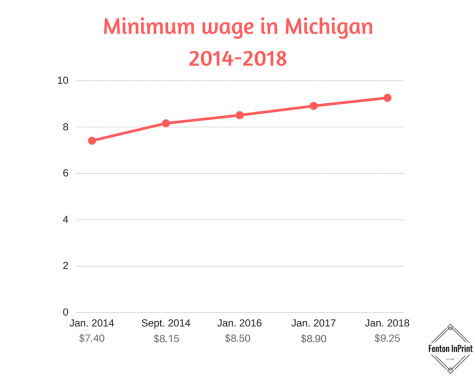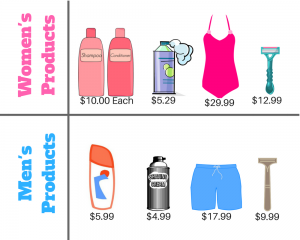Minimum wage raises from $8.90/hour to $9.25/hour
January 16, 2018
Another day, another dollar. As of January 1, the minimum wage is $9.25 an hour, compared to a previous minimum of $8.90. Michigan has seen many raises in minimum wage over the past few years, as a part of a law passed in 2014 (which began in 2016) that raises hourly wages each year. This is the third and final installment passed, which is in place to help those working minimal-paying jobs support themselves or their family.
“Ultimately it’s going to mean that I’m going to have to raise our prices, to compensate for everybody making more per hour,” Owner of The Barn Jason Warda said. “We still need to maintain our profit margin. The only way to do that would be to cut hours or increase the amount of money we’re bringing in. We’re not going to sacrifice service, so the only option is to increase our prices.”
However, numbers on paper may not include the true effects of raising hourly wages. While the number in an employee’s bank account may be higher, the value of that dollar may be lower. This happens because in order to pay their employees the new standard, companies are forced to drive their prices upward. When this happens on a statewide scale, the value of a dollar decreases. In essence, raising minimum wage can increase the rate of inflation.
“Cost of goods go up, and minimum wage has to go up to keep up with it,” Warda said. “Which one comes first, you could point fingers. Unfortunately, that’s just how economics work. Prices are always going to slide up, it doesn’t really change the value of a product. An hours worth of work is worth a burger, the dollar value behind that is constantly changing. When I owned Jimmy John’s, minimum wage was almost always about the same as the cost of a sandwich.”
In addition to making the value of the dollar lower, raising minimum wage can decrease the size of the middle class. While a fast food restaurant may have to up their wages, a company paying $15/hour will not, which means that those middle class workers are earning less due to inflation, even though the dollar value is the same.

“It brings the lower classes, the less fortunate, up closer to the middle, so it effectively moves the people in the middle down,” Economics Teacher Kevin Crimmins said. “It doesn’t affect your income if you make 50 grand a year, except prices go up, so your salary doesn’t buy as much as it used to. Wages in general have lagged behind the rest of the economy, and I think that whatever we can do to increase wages should be done, but not just minimum. One of the purposes of government is to distribute income fairly, and this is just an attempt to do that. I’m not against the minimum wage, because it’s a start, but I think all wages should go up. ”
The law which raised minimum wage over the last few years is not the first of its kind. Between 2004 and 2008, there was a similar system in place. With inflation constantly shadowing the economic world, workers can expect more raises in minimum wage to match the rate of inflation. For now, however, instead of a dollar a day, it will be $9.25 an hour.










